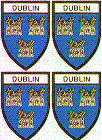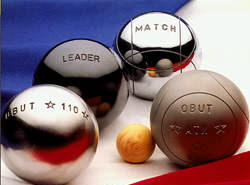|
How many boules do I need? For singles (one against one) and doubles (two against two) three boules each, for triples (three against three) two boules each.
Why are there sets of 4 and 8 boules? These are leisure (“dog”) boules and are mainly used for family or social games. A set of 8 is a cheaper way for 4 people to play but with only with 2 boules each. Be aware that sets of 6 leisure boules are often sold as 3 pairs, a somewhat illogical combination, making it difficult for 2 people to play. Competition boules are only made in sets of 3.
How much does it cost? Sets of boules range from about €20 for leisure boules to €150 for top of the range competition boules. You don't actually need anything else, although a tape measure and scorer are often handy. Specially curved, very strong magnets are available to pick up boules if you have trouble bending. Pétanque is traditionally a fairly informal game, not requiring any special dress or footwear.
Am I good enough to join a club? YES!!! Most clubs welcome players of all standards, including beginners, and usually offer both social games and competitions.
What sort of surface can you play on? Almost anything with some sort of gravel surface, preferably well drained and with a firm base. An uneven, irregular terrain is much better to play on than a flat, featureless terrain. Remember that the typical Provençal terrain is the village square, complete with slopes, stones, tree roots, etc., all of which contribute to the character of the game. Grass is one of the least suitable surfaces and is best avoided unless there is absolutely no alternative.
What is “shooting” and “pointing”? Pointing is when you try and place your boule close to the cochonnet, Shooting is when you try and hit an opponent’s boule out of the way. They are the basic skills of the game and are what make pétanque a skilful, tactical and exciting game. The French are generally much better shooters that the British, one reason why they normally beat us! Like football, pétanque without shooting is a very dull game.
Can you play “under-arm”? While there isn't a rule against it, playing “under-arm” allows very little control of the boule, which is why everybody plays with their hand on top of the boule, allowing the boule to be spun and controlled.
Why do some players throw their boules high in the air? You can only successfully roll a boule on a smooth terrain and where there are no boules blocking your way. If you roll a boule on an irregular terrain, it will take an irregular course. Lobbing a boule means that it rolls less and can therefore, with skill, be pointed more accurately. You need to check where you want your boules to land and see if the terrain is hard or soft and if there are any buried stones that could deflect your boule if hit.
If a boule or boules are blocking your path then you must either learn to spin your boule around them or lob over them.
What is a “carreau”? This is a perfect shot, when the shooter hits the opponent’s boule out of the way and their own boule takes its place.
Why do I always play short (/long)? Firstly ask a coach or more experienced player for their advice, as you probably need to modify how you are playing. If, in spite of all your efforts, you persistently throw too long or too short, a heavier boule should help you play shorter, a lighter boule should help you to play longer.
Can 3 people play? Pétanque is really an adversarial game for two opposing teams. 3 is an awkward number. If you play “1 against 1 against 1” then shooting, unless a carreau, often benefits the third player rather than the shooter. Better to have a game of singles, let the other player practice and play the winner.
More fun is to play “2 against 1”, with, say, 4 boules per side. To make it more interesting, and to help develop your tactical awareness, the team of 2 has a shooter and a pointer, with this proviso: the shooter must always shoot, the pointer must always point. The single player can do anything.
Better still, join your local club and meet more players! If you are playing 3s and a fourth player arrives, why not “call it a draw” and invite them to play doubles. If there are two groups of three playing on the same terrain, maybe it’s the players’ social skills rather than their pétanque skills that need improving…
What about other "odd" numbers? Generally divide people up into opposing teams, with the same number of boules for each team. To choose teams at random, one lucky person takes one boule from each play and a coche, throws them all at once and takes, say, the 2 nearest to play together against the other 3. Before throwing, announce what the groupings will be - 2 nearest, etc. After throwing: make sure you know who you're playing with and who you're playing against - don't just pick up your boule and wander off !
5 Players Play 2 against 3, 6 boules per side.
7 Players Either play 3 against 4, 8 boules per side or one game of 2 against 3 and one game of singles. Switch round after each game.
9 Players One game of doubles, one game of 2 against 3, then play "winners play the winners", "losers play the losers", or switch round.
Follow the same principle for other numbers.
What's the difference between "boules" and "pétanque"? "Boules" are both the boules that you play with and the general name for various boules games, including Pétanque, Le Jeu Provençal and Boules Lyonnaise. Pétanque is by far and away the most popular of the different boules games. Played 6 - 10m, it's the "easiest" game to play and requires the least space.
Le Jeu Provençal or La Longue (the long game), from which pétanque is derived, is played with the same boules but from 15 - 21m. The rules are similar except the pointer takes one step out from the circle and can either keep the other foot in the circle or bring the foot forward but it must not touch the ground. The shooter takes 3 running steps (les trois pas) and shoots while on the move. Shots must land within 1m of the target boule, rolling shots à la rafle, are not allowed - this is the reason why the French purists disapprove of them in pétanque. Le Jeu Provençal is still played in the south of France but being more difficult and requiring a much larger area has nowhere near the following of pétanque. In practise, both in France and in the UK, pétanque is so popular that is used synonymously with boules. People will say "Let's have a game of boules" which, if you wish to be pedantic, really means pétanque.
|

